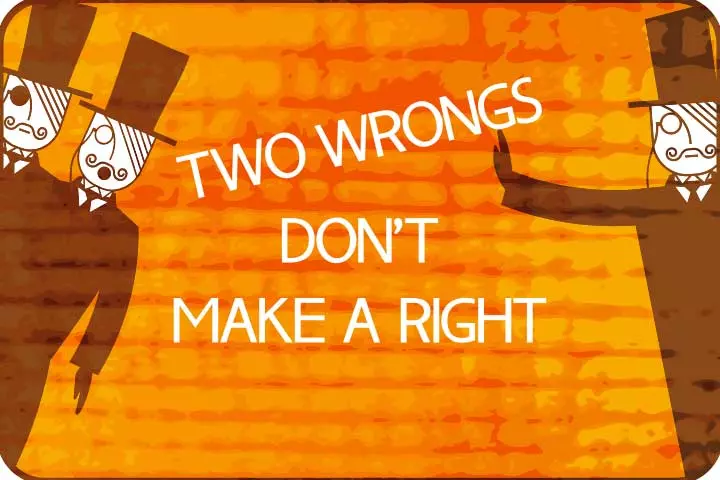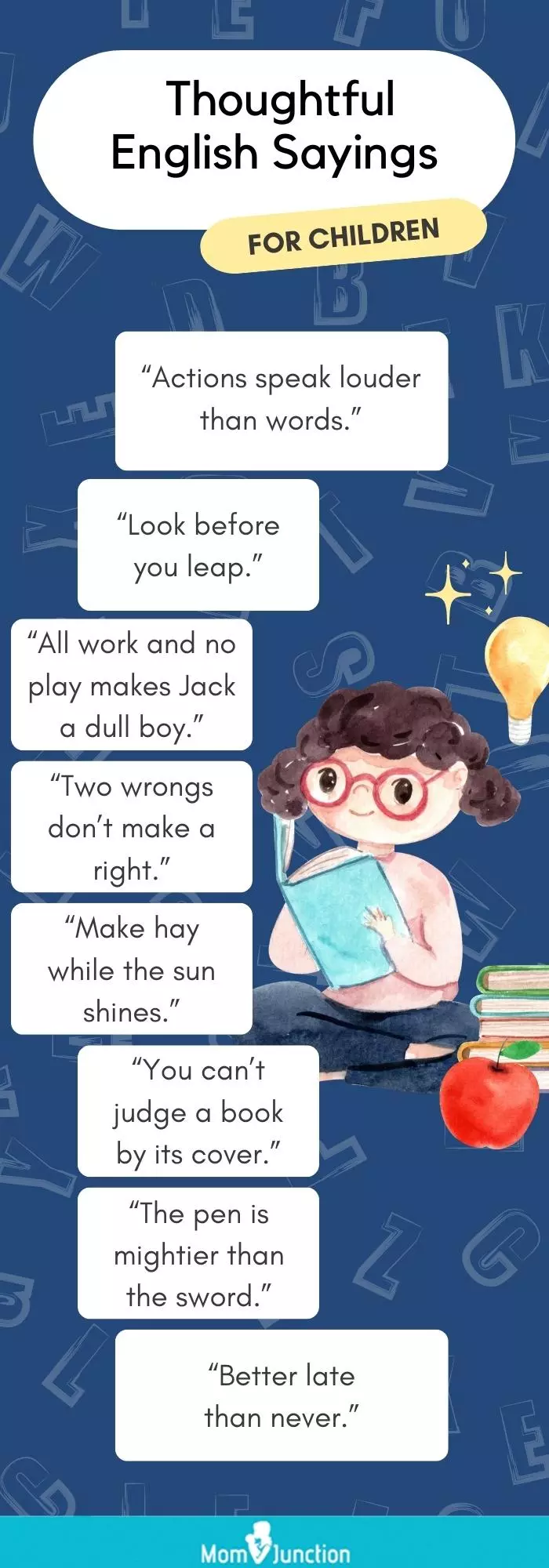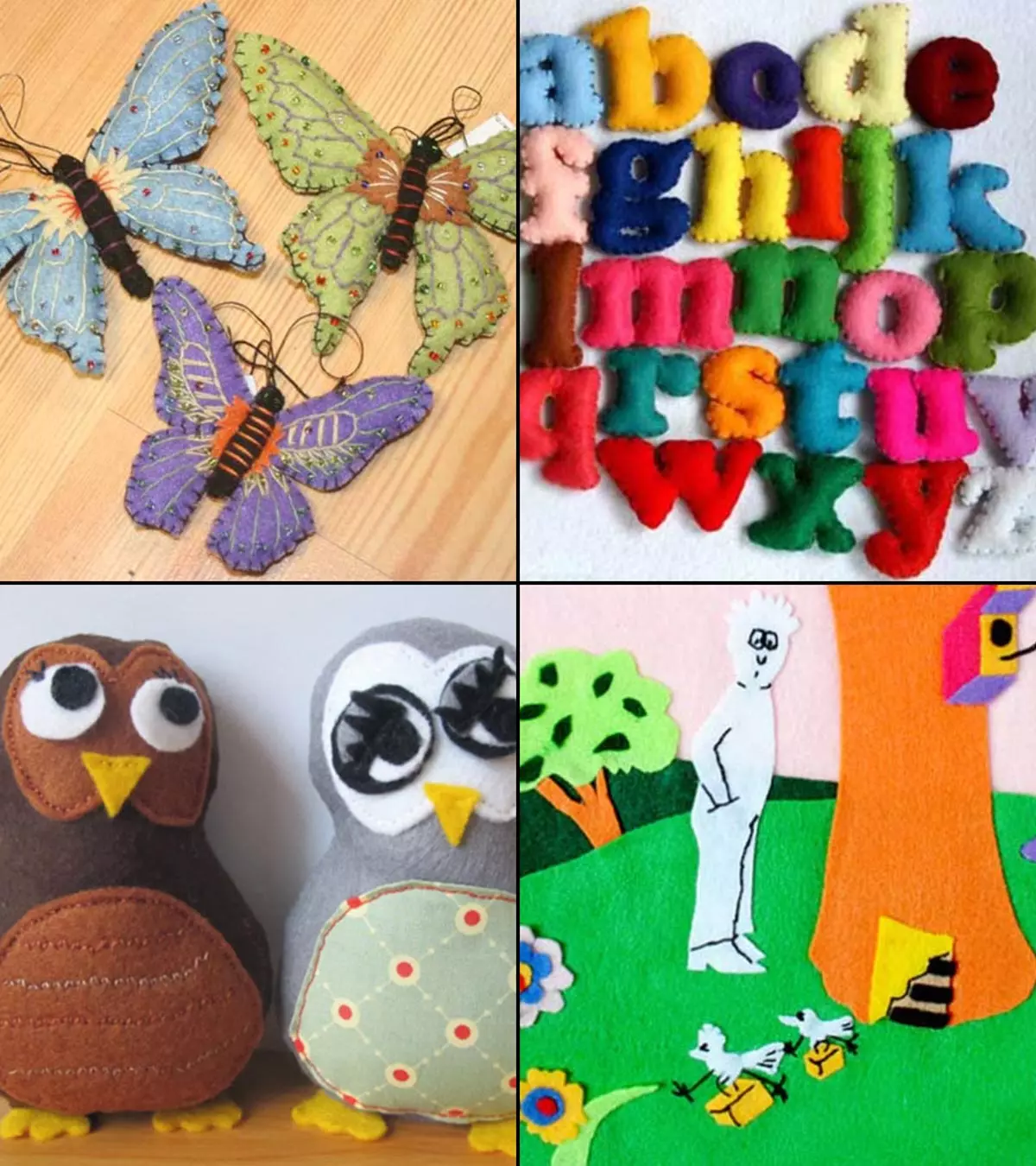
Image: Midjourney/ MomJunction Design Team
Proverbs are aphorisms that impart wisdom, advise good, and express deep, meaningful truths about the universe. Proverbs for children can be a great way to impart knowledge and wisdom that they may not understand through a normal conversation. They can even inform you about culture, places, personality traits, and a lot more. Furthermore, proverbs can enhance children’s vocabulary and lay the foundation for building their critical thinking skills. By analyzing these sayings, they can learn to relate abstract concepts to their everyday experiences. This post features some of the most widely used and famous proverbs that you may share with your children and explain their meanings. Once they understand, they will imbibe the thoughts in their daily lives.
Key Pointers
- Proverbs help strengthen three critical areas in children: moral, intellectual, and emotional.
- Exploring proverbs as a family builds a shared vocabulary and helps you communicate better with your kids.
- To help your children understand the meaning of proverbs, relate them to real-life situations and anecdotes from your past.
- Proverbs help children understand concepts you may not be able to impart through simple conversations.
Some Interesting Things About Proverbs
Before we explore some of the famous proverbs, here are a few things that might interest you:
- Proverbs are also called axioms, old saws, sayings, or adages.
- A few educational proverbs in English are borrowed from other cultures.
- Proverbs are wise sayings that can provide you with answers to several questions about life.
- They can help you improve your language skills and make you wiser.
- Proverbs can help you sound sophisticated.
- Moral stories for children are the best way to teach proverbs.
- Proverbs can help children learn cultural values, as many reflect the beliefs and practices of different communities.
30 English Proverbs For Children, With Their Meanings
Here’s a list of 30 simple and short English proverbs for students, along with their meanings:
1. A friend in need is a friend indeed.
You may have many friends, but a true friend is someone who helps you at a difficult time or when you really need help.
Did you know: This proverb is found in many languages. The earliest version of it was in Latin and dates back to the 3rd century BC.
2. Actions speak louder than words.

What you do is more important than what you say. If you say one thing and do something else, there is no meaning in what you have said.
Did you know: The proverb dates back to 1628 and was first voiced by John Pym, an English parliamentarian, during the English Civil War.
3. A little learning is a dangerous thing.
The proverb conveys the idea that if a person shares their views and opinions without much knowledge on a particular subject, it could lead to dangerous situations. It is a warning to us that we should do extensive research on a topic before we think we are an expert on it.
Did you know: This proverb has been in use since the 18th century and is attributed to Alexander Pope, a great English poet.
4. A stitch in time saves nine.
It is better to deal with a problem early and in time because if we keep postponing, it could get worse and take longer to deal with.
Did you know: This adage has its roots in the 18th century and is attributed to Thomas Fuller, a British physician, preacher, and intellectual.
5. All that glitters is not gold.
Gold is a precious and rare metal, but there are other metals that look like gold. The proverb tells us that not everything that looks good on the outside is valuable.
It also tells us that we should not judge a person by their looks because they may look innocent but be completely different.
Did you know: This saying is attributed to William Shakespeare. It appears in his play The Merchant of Venice as “All that glisters is not gold.”
6. All work and no play makes Jack a dull boy.
We should make time for relaxation and not work all the time. Focusing all our time on work could make us dull and is also unhealthy.
Did you know: The first record of this adage in print dates back to the 17th century.
7. A bird in the hand is worth two in the bush.

The proverb expresses the idea that we should not risk losing something we have to get something that we think is better. If you do, it may result in nothing.
Did you know: This adage is attributed to John Capgrave, an English historian of the 15th century. The original version reads, “It is more sekyr [certain] a byrd in your fest, Than to haue three in the sky a‐boue.”
 Trivia
Trivia8. An apple a day keeps the doctor away.
The proverb expresses the idea that eating fruits daily can help us maintain good health.
Did you know: In Old English, the word apple was used to describe any round fruit that grew on a tree.
9. Better late than never.
It is better for someone to be late than never to arrive at all. It can also mean it is better to do a task (or a good deed) late than never do it at all.
Did you know: This proverb is attributed to Geoffrey Chaucer, a great English poet and author of the 14th century. The original version reads, “For bet than never is late.”
10. The early bird catches the worm.
It is used to tell someone that if they do something before anyone else, they have an advantage.
Did you know: This proverb first appeared in a book of proverbs compiled by John Ray in the 17th century.
11. Don’t count your chickens before they hatch
The proverb expresses the idea that we should not make hasty calculations and build castles in air even before we have anything concrete in our hands.
Did you know: This proverb first appeared in Thomas Howell’s New Sonnets and Pretty Pamphlets in 1570.
12. Don’t put the cart before the horse.
This proverb is used to tell someone that they are doing something in the wrong order.
Did you know: This saying is known to have been in existence in English since the early-1500s.
13. Every cloud has a silver lining.
This old saying conveys the meaning that every situation has some good or positive aspects. It is generally used to encourage someone who is facing a difficult situation or problem.
Did you know: This adage is commonly attributed to John Milton. It appears in his poem Comus as, “Turn forth her silver lining on the night, And casts a gleam over this tufted grove.”
14. Curiosity killed the cat.

This proverb conveys the idea that being too curious about something can get one into trouble. It is also used to tell someone not to ask too many unnecessary questions about something.
Did you know: This wise saying is attributed to the 16th century English playwright Ben Jonson.
15. Look before you leap.
The proverb tells us that we shouldn’t act or make a decision before considering the possible consequences and dangers.
Did you know: Doesn’t this remind us of Aesop’s fable about the fox and the goat? In fact, the proverb alludes to that story.
16. Make hay while the sun shines.
This is an old saying that tells us to make the most of a good situation or an opportunity that is not likely to last long.
Did you know: This adage has a close resemblance to Proverbs 10:5 in the Book of Proverbs of the Bible, which reads, “He who gathers crops in summer is a prudent son, but he who sleeps during harvest is a disgraceful son.”
17. Pride comes/goes before a fall.
If you are overconfident about your abilities, something bad will happen that will make you look foolish.
Did you know: This proverb is a variant of Proverbs 16:18 found in the Book of Proverbs, which reads, “Pride goeth before destruction, and a haughty spirit before a fall.”
18. Rome wasn’t built in a day.
It takes time and effort to achieve something important. Good things do not happen overnight.
Did you know: The earliest version of this saying appeared in the collection of medieval French poems Li Proverbe au Vilain in the 12th century. It came to be used in English only in the 16th century.
19. When in Rome do as the Romans do.
When you are visiting another place, you should follow and abide by the customs of the people in that place.
Did you know: This saying dates back to 390 AD, and appears in St Augustine’s Letter 54 to Januarius. The letter was translated to English in 1951.
20. Every dog has its day.
This old proverb is often used to say that everyone will have luck or success at some point in their life.
Did you know: This adage dates back to the 16th century and is attributed to Queen Elizabeth I.
21. Strike while the iron is hot.
The proverb tells us to take advantage of an opportunity as soon as it arises.
Did you know: The adage is attributed to Richard Edwards, a 16th century English poet, playwright, and composer.
22. Two wrongs don’t make a right.

If you do a wrong, do not try to cover it up with more wrongs, because this way you can never make it right.
Did you know: The proverb is believed to have been first used in 1783 and went as, Three wrongs will not make one right.
23. A journey of a thousand miles begins with a single step.
Great things start with simple beginnings. No matter how difficult a task may seem, it is important to start it in order to finish it successfully.
Did you know: This adage is attributed to Laozi (Lao Tzu) and first appeared in the Tao Te Ching, a classical Chinese Taoist text that was written between the 4th and 6th century BC.
24. As you sow so you shall reap.
This is a biblical proverb that conveys the message that if you do good to others, others will do good to you in return.
Did you know: The original version of the proverb appears in Galatians VI of the Bible as, “Whatsoever a man soweth, that shall he also reap.”
25. You can’t judge a book by its cover
The proverb is used to convey that you shouldn’t judge a person or thing based on their outward appearance.
Did you know: This adage first appeared in 1867 in the newspaper Piqua Democrat.
26. An idle mind is a devil’s workshop.
If we allow our mind to remain idle or do not occupy ourselves with constructive work, we end up thinking about evil and mischievous things.
Did you know: The English version of the proverb can be found in works as early as the 12th century when Chaucer referred to it.
27. Don’t put all your eggs in one basket.
This popular adage means that you shouldn’t put all your money, hopes, etc., in one single thing, because if that endeavor fails, you will be left with nothing.
Did you know: This proverb is known to have first appeared in the novel Don Quixote by Miguel de Cervantes. The novel’s version reads, “It is the part of a wise man to keep himself to-day for to-morrow, and not to venture all his eggs in one basket.”
28. A penny saved is a penny earned.
This common saying is used to emphasize the importance of saving money. It also conveys that saving money is as important as earning money.
Did you know: This old saying is attributed to George Herbert, a major English religious poet of the 17th century.
29. It’s no use crying over spilled milk.
It is a saying that is used to tell someone not to worry about something that has already happened because they cannot undo it.
Did you know: Jonathan Swift’s Polite Conversation in 1738 contains the phrase, “Tis a folly to cry for spilt milk”.
30. The pen is mightier than the sword.

Thinking and writing have more influence on people than the use of force.
Did you know: This proverb appears in the play Richelieu; Or the Conspiracy, written by Edward Bulwer-Lytton in 1839.
Bible Proverbs
The Bible is an excellent source to teach moral lessons to children. Here are some famous quotes from the Bible.
- The fear of the Lord is the beginning of wisdom, and the knowledge of the Holy One is understanding.
Proverbs 9:10
- Commit your activities to the Lord, and your plans will be established.
Proverbs 16:3
- A joyful heart is good medicine, but a broken spirit dries up the bones.
Proverbs 17:22
- For I am convinced that neither death nor life, neither angels nor demons, neither the present nor the future, nor any powers, neither height nor depth, nor anything else in all creation, will be able to separate us from the love of God that is in Christ Jesus our Lord.
Romans 8:38-39
- Trust in the Lord with all your heart, and do not lean on your own understanding. In all your ways acknowledge him, and he will make straight your paths.
Proverbs 3:5-6
Frequently Asked Questions
1. What is the simple definition of a proverb?
A proverb in English is just a virtuous expression or saying passed down through generations and serves as words of wisdom. Proverbs are based on wisdom and help people take the right path.
2. What are proverbs used for?
Proverbs can be used for various reasons. They can be used to reinforce admonitions, morals, impart knowledge, offer advice, find solutions, and help understand things easily and effectively.
3. How can I teach proverbs to children?
Find proverbs that are appropriate for your child’s age. When you find them, explain their meanings in simple terms. To make the child understand effectively, relate the proverbs to real-life situations. You may also explain the cultural significance of proverbs, which will ignite more curiosity in your child. Illustrate the ideas of proverbs through visual aids. Remember not to stop after teaching a specific set of proverbs. Give your child various chances to practice proverbs so they become a part of their daily vocabulary.
Mr. P, an English language teacher and a blogger, shares how he makes his students learn and understand the meanings of proverbs. He says, ”I shared this document which had examples of famous proverbs but only the first part to them. The children were then given the opportunity to complete the proverb with their own ideas. The children were aware of some but the challenge was to make sure the saying then had a message. I was blown away by some of their ideas but more of their meanings. Once the children had created their proverbs, they were challenged to create a video on Adobe Spark Video where they could orally explain the meaning behind their proverbs (i).”
4. How do proverbs help children develop critical thinking skills?
Proverbs have deeper meanings that cannot be easily understood by listening to these phrases. Children need to analyze them and know how they apply to real-life situations. This practice boosts their critical thinking skills. Children also learn to creatively use English words and describe things. This can only happen when they practice their critical thinking skills. The usage of proverbs develops the linguistic intuition of children, which means exploring the limits of grammatical structures in the English language (1). This naturally makes them critical thinkers.
5. How do proverbs teach children essential life lessons?
Proverbs give common-sense advice or observations about human behavior in concise forms. Thus, they impart practical wisdom about life. They also teach children about virtues such as honesty, patience, and perseverance. Many of these statements emphasize the importance of careful planning and being proactive. By knowing them, children find out that people have diverse beliefs, backgrounds, and experiences. Thus, they become more empathetic toward others and act compassionately.
6. How can proverbs help children develop a sense of self-awareness and self-reflection?
Proverbs offer valuable life lessons for kids and can help them develop self-reflection. To encourage this, ask your child how a proverb applies to any situation they have faced. It will make them reflect on their experiences. Apart from this, discuss how proverbs emphasize kindness and empathy. You may ask the child to think of their actions about a particular proverb. It will make them aware of their behavior and improve it.
7. How can parents use proverbs to teach life skills?
Parents can introduce proverbs during conversations and relate them to real-life situations. They may also introduce proverbs through stories with moral lessons that expound on these sayings. Also, encourage your children to reflect on the meanings of the proverbs and use them to express themselves.
The importance of moral values for kids is undebatable, and proverbs can be a valuable tool in introducing your child to moral values. Using proverbs makes it easier to explain the complex functions and truths about the universe and makes one wiser. We have included popular proverbs in the English language that you could share with your little one. We hope that this list of proverbs in English for students will be helpful for you when you need to make them understand things that cannot be conveyed through standard sentences of explanation. You can also explain other concepts of English to your child to improve their language skills.
Infographic: Famous English Proverbs For Children
Educating children about profound sayings could help them learn vital life lessons and make the right decisions by themselves. Our infographic can be your quick guide to sharing some simple and informative English proverbs with your children. Illustration: Momjunction Design Team
Illustration: Best English Proverbs For Children With Meanings

Image: Stable Diffusion/MomJunction Design Team
Check out this video to learn some of the most commonly used proverbs and their meanings! Get your children ready to expand their knowledge and vocabulary!
Personal Experience: Source
MomJunction articles include first-hand experiences to provide you with better insights through real-life narratives. Here are the sources of personal accounts referenced in this article.
i. Creating our own proverbshttps://mrparkinsonict.blogspot.com/2018/06/creating-our-own-proverbs.html
References
1. Using effective techniques for developing critical thinking of the learners while teaching English proverbs and sayings; Core.ac.uk
Community Experiences
Join the conversation and become a part of our nurturing community! Share your stories, experiences, and insights to connect with fellow parents.
Read full bio of Elisabeth Daly
Read full bio of Wedetso Chirhah
Read full bio of Harshita Makvana



















